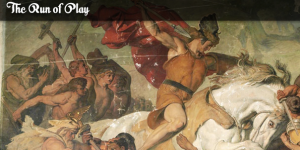By Lindsey Barrett
As a total soccer neophyte, the prospect of browsing through dozens of technical, wonkish sportsblogs seemed more than a tad daunting. And I came across more than a few that frankly bored me to tears—I find sports in general, and soccer in particular, fascinating, but my lack of technical expertise makes reading a technical rundown of Real-Juventus-United-Barca like reading an Ikea manual. But after drifting through far too many blogs I hated, I stumbled across one I didn’t.
The Run of Play is a soccer blog edited by Brian Phillips, with staff writers Zach Dundas, Fredorrarci, Supriya Nair, Alan Jacobs and Richard Whittall. It is a blog about the “wonder and terror of soccer”– the contributors focus on “the beautiful, the bewildering, the haunting, and the absurd.” So the description certainly drew me in; one of the things I find the most fascinating about soccer are the elements that are so commonplace, yet so detached from rationality, the “haunting” and “absurd.” And once I began reading, I was hooked—Play isn’t a blow-by-blow recounting of whomever got traded for whatever preposterous sum that day or a simple rundown of technical feats. It’s original, fascinating editorials about a gamut of topics from race, gender, globalization, soccer as ideology, and scads of others.
But it wasn’t just the range of topics—what I really enjoyed about Play was the quality of the writing. Eloquent and erudite while still relevant and irreverent, each piece struck just the right chord, the perfect blend of intelligence with actual readability. (Do you read the New York Review of Books blog for fun? No, you do not.) As someone who is interested in sports without being particularly knowledgeable about it, the blog was the perfect mix of soccer and cultural commentary.
The first piece I came across was an article about the Brazilian player Sócrates, or rather the carpe diem attitude that drove him to such great heights professionally, and to such depths personally. Alan Jacobs describes the death of Sócrates in describing the way in which he played—fearlessly, never saying no when he could say yes. Jacobs contrasts him to the title character of Melville’s Bartleby the Scrivener—“Sócrates went through life saying, “I prefer to.” I prefer to drink; I prefer to smoke; I prefer to back-heel the ball; I prefer to take penalties without a silly run-up.” The post is erudite, fluid, and episodic enough to grab your interest (and to be the perfect size for a blog) without compromising depth or quality.
The next piece I read was “Race, Language, and Symbolism,” by Elliott. The piece stemmed stemmed from the then-recent controversy of Luis Suarez and Cesc Fabregas using racist slurs, but branched into a larger discussion of how we understand racialized language, and how wrongly bifurcated such conversations often are. Yes, Elliot argues, someone who uses a bigoted word or slur can be operating under mistaken and offensive assumptions; but it is counterproductive to rubber stamp every possible linguistic nuance as racist without examining the linguistic and cultural context from whence it came. He further proposes that many cultures (particularly the US) like to imagine that a kind of colorblind world in which all things are inherently, perfectly equal is possible, when it’s not. Race forms and molds identity, and cannot be ignored. Nor can it be, ahem, denigrated, but pretending that different associations and experiences simply don’t exist makes discussion impossible, or as Elliott puts it, “like arguing about a weekly grocery budget with your spouse while a bank forecloses on your house.”
That piece in particular struck me because it was so remarkably astute¾ moreover, it implicitly expounded on why millions of people are so fascinated by sports, and soccer in particular. It is a microcosm of the human experience, at once escapist and impossibly relatable. Race is a frequently significant part of soccer discussions because it’s a key part of global The most serious issues and tensions of our time have played out on the soccer pitch, and the most trivial. That ability to deftly universalize from specific instances without vaguely generalizing is the greatest strength of Play. Were I to isolate any weaknesses, it is at times slightly light on the technical; but as I discovered before finding this one, there are scores of blogs that focus on the technical. There are far fewer blogs that manage to combine the cultural and the sporting without getting lost in a cul-de-sac of their own self-righteousness, or even manage to involve culture at all; this one not only combines the two, but does it with aplomb.

